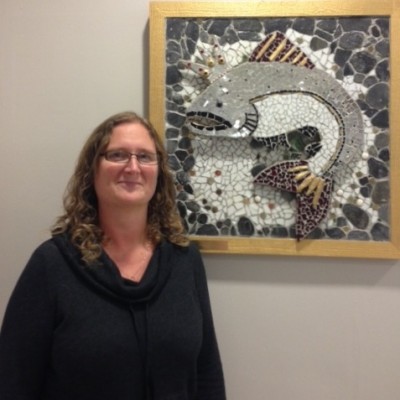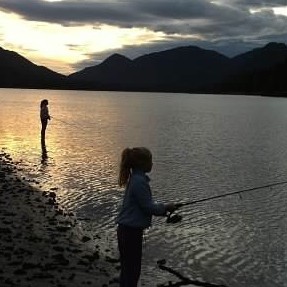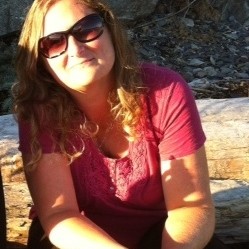“I am not the visible leader people see and recognize immediately. I am the quiet leader who shares information and facilitates events and schedules so that things can be accomplished successfully.”
Natasha O’Brien is a Counselor at Ketchikan High School. She is mentor to 2015 Gates Scholarship applicant Chloe Miller, and co-teacher/mentor (with Robert McClory) for Class of 2014 Gates Millennium Scholarship winner Martina May Brown.
Press Release: Three Alaska Students Receive Gates Scholarships
KRBD story: Ketchikan student wins full-ride Gates Scholarship
2015 Reflection on Gates Scholarship Application Experience
My experience with the Gates Millennium Scholarship this year was a wild ride that began slowly, with the student meandering her way through the essays, and finished with an overwhelming rush of edits and completions that required vast amounts of time from me and from the student I was working with. We had a major setback about a month before Christmas, when my student was injured and was overwhelmed by missed school work and commitments to work. She did not think she would have the time needed to complete her essays, but in the end, she responded to our urging, and she came back from her time out of school ready to work.
I was impressed by my student’s perseverance, which is the quality that most clearly defines her in my eyes. Despite, or more likely because of, some tough life circumstances, she is unafraid to pursue her dreams, which include leaving the security of our tiny island community to obtain a college education and then returning home to work in her chosen field and better her community. Helping her complete her Gates application felt like helping her find a new way of life.
Tad and Dean were invaluable throughout this process, providing another voice of encouragement when our student wanted to give up, and talking her through each essay, making suggestions to help her refine her story.
My colleague and I have already met with a few potential applicants for next year. We are absolutely committed to following through with another round. Though this is a time consuming and often gut-wrenching process, drawing out stories and painting pictures with words, the potential reward outweighs all of that.
WHY I TEACH
When I consider if I chose my career in education or if my career chose me, I would have to say that the career chose me. I simply cannot remember a time when I wasn’t going to be a teacher. When I thought about my life as an adult, I was in a school. When asked, of course I was going to be a teacher. Sure, there was the youthful consideration of becoming a monkey researcher when I was 10, with elaborate plans for a custom room for my rescue monkeys in my house in the rainforest, but after my fascination with Jane Goodall ran its course, the monkey researcher idea did, too. And, as always, my life veered back to teaching.
As a child, I loved school. I was always thinking about what I was going to learn next, where I would go in my next book, and what worlds I might create in my next story. I loved my teachers. I admired them mostly for who they were in my life. Yes, they knew things that I wanted to know. But they also very clearly adored children and appeared to me to enjoy what they did each day. And then in sixth grade, my teacher took our class on an overnight field trip to stay on an historic boat in San Francisco. We each had our roles, and I was a Longshoreman. I stood watch in the rain at 3 AM, and I learned what it might have been like to be a sailor in the early years of our country. My teacher’s enthusiasm and that experience fed my love of learning. In high school, I had a fabulous Spanish teacher whose songs from those random days when we would walk into class to find him perched on the edge of his desk strumming his guitar still run through my head. Mr. C encouraged me to continue with a fourth year of Spanish because I loved it rather than taking another class because I thought I should. He was there for me as a quiet presence when my brother died my senior year. He reminded me to apply for college when my guidance counselor was invisible and my mom was unreachable in her grief. He inspired me to be that one adult in a child’s world who believed anything was possible.
As I began college, the question wasn’t what would I be, but what would I teach. I began as an English major because reading and writing were what I loved; I morphed into a Spanish major because I loved the language and I wanted to be like Mr. C, and I learned that there were many, many young people in California for whom Spanish was their first language; I briefly considered myself a history major before I realized that I couldn’t retain pertinent facts well; and I finally returned back to my first love, reading and writing, and decided that I would be an English major (with a Spanish minor) and teach high school English.
My journey in education continued as I began my first job as an English teacher at Ketchikan High School. The idea that teaching might actually be a beginning point on my way to a career as a guidance counselor came to light in my first job interview. My answers reflected my thoughts of what a teacher should be – someone who cares about their students, who learns about them through their writing, who gets to know them beyond their spot in their desk.
My interviewer, the assistant superintendent, was the first to ask me if I had ever considered working as a guidance counselor. At that time, I had not, and I went on to work as an English teacher at the high school. I learned much during my five years as a teacher. One of my mentors during those years was the vice principal of the school who eventually came back into the classroom and ended up teaching next door to me for a couple of years.
He taught me to see my students for who they really were and not stop at the initial impression. He encouraged me to find humor in some of the more exasperating moments of my typical young teacher days. And he confirmed my suspicions that I might have something different to offer students beyond the walls of the classroom and should consider pursuing my degree in counseling.
After five years in the classroom, I spent nine years at home with my children, working on a course here and completing a summer session there. I earned my masters degree in educational counseling and returned to the schools first at the junior high and finally moving back to the high school, where my career in education had begun 15 years earlier.
My mentors now are my principals. They have encouraged me to continue to grow in my profession. They believe in my ability to reach out to our students and make meaningful connections. They have been excellent sounding boards when I’m not sure what path to take in difficult situations. They appreciate my contributions to the school. And, most importantly, they clearly care about kids and with each decision they make, they show clearly that, despite the politics found in every school building, education is about what’s best for our students.
In my job as a counselor, I mentor many students. They come to me with concerns about friends, frustrations with family, and some come to me from truly tragic circumstances looking for someone to point out a path and encourage them to stay on it when it would be much easier to take another less productive one. I also mentor teachers who come to me with questions about how to handle a difficult student or how to approach a difficult conversation they want to have with a child they have come to care about.
My career in education has, I believe, been chosen for me. I love being in the schools. I love working with young people. And I believe I can make a difference in the lives of the children I work with.
LEADERSHIP
I’ve never considered myself a leader. I was the middle child who followed her older brother around as much as he would allow. I was the shy student who did not volunteer for anything in class. I was the teenager and young adult who was always working quietly in the background to get things done.
When I was hired as a counselor at the middle school, I found myself in a new role. My principal included me in discussions about programming, and I gradually became involved in many decisions as we were shaping a new vision for our school. I traveled with the principal and another staff member to visit and observe at a school district that was running a new program we were interested in and became hooked on this new way of doing business in our schools.
Upon our return, I was tasked with making changes to the school schedule to accommodate our new ideas. I was also asked to run a training program for the teachers intended to sell them on making some fairly drastic changes to our regular routine. Eventually, I became the coordinator of this program, and my work impacted the daily happenings in our school and in the lives of all of our teachers and our students.
This experience taught me that I am a leader. However, I am not the visible leader people see and recognize immediately. I am the quiet leader who shares information and facilitates events and schedules so that things can be accomplished successfully. I’m still that quiet person working in the background to get things done, but I am also quietly leading to accomplish the goals of our school.
Teacher/Mentor Experience with Gates Millennium Scholarship Applicant
When I first identified May as a student who could qualify for this scholarship, I brought her in and asked her if she would be interested in going through the process. At first, I think she was interested in theory, but her first forays into the essays were quick and not particularly detailed. I worked with her mostly on editing and asked her to put more thought into her answers. As I commented on her papers, I asked her to make corrections and changes and additions and then asked her to take them to Rebecca Bowlen, her English teacher, so another set of eyes could take a look at her writing. We went through several drafts, back and forth between Mrs. Bowlen, May, and me, in the fall, but it wasn’t until Christmas break that I felt like May had really committed to the process and was putting serious effort into revising her essays.
After she had been through several drafts and was closer to telling her story rather than simply writing the requisite essays, Mr. McClory began working with her to fill out the recommender portions of the application. This included helping her find a teacher willing to step in at the last minute to write something for her when her first choice recommender did not follow through.
Finally, having Tad and Dean available to help her finalize her essays was invaluable. They spent the majority of the last week before the Gates deadline, right up until three hours before the applications were due, talking and editing her through each essay and making suggestions to help her refine her personal story.
Going through the process with a student has impressed upon me the amount of time needed from the student as well as from the adult mentors to actually complete a Gates Application. With future students, I will push for drafts sooner and emphasize that applying for this scholarship requires a huge commitment of time so the student understands up front the work that will be required.
I would love to be able to commit more time to drawing out the student’s stories, but in the crazy life of a high school counselor, this is often not possible. For next year, Mr. McClory and I have been coming up with a list of names of people in the community who may be willing to help with that part of the process.
Both Mr. McClory and I have already created a list of potential applicants for next year. We are absolutely committed to following through with another round next year and hope to have in place some outside adult mentors who can help us draw the students through the process.




